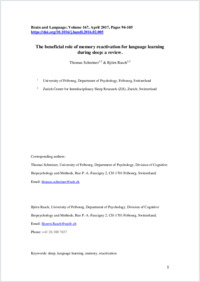The beneficial role of memory reactivation for language learning during sleep : a review
- Schreiner, Thomas University of Fribourg
- Rasch, Björn University of Fribourg
-
2017
Published in:
- Brain and Language. - 2017, vol. 167, p. 94-105
Speech and Hearing
Linguistics and Language
Experimental and Cognitive Psychology
Cognitive Neuroscience
Language and Linguistics
English
Sleep is essential for diverse aspects of language learning. According to a prominent concept these beneficial effects of sleep rely on spontaneous reactivation processes. A series of recent studies demonstrated that inducing such reactivation processes by re-exposure to memory cues during sleep enhances foreign vocabulary learning. Building upon these findings, the present article reviews recent models and empirical findings concerning the beneficial effects of sleep on language learning. Consequently, the memory function of sleep, its neural underpinnings and the role of the sleeping brain in language learning will be summarized. Finally, we will propose a working model concerning the oscillatory requirements for successful reactivation processes and future research questions to advance our understanding of the role of sleep on language learning and memory processes in general.
- Faculty
- Faculté des lettres et des sciences humaines
- Department
- Département de Psychologie
- Language
-
- English
- Classification
- Psychology
- License
-
License undefined
- Identifiers
-
- RERO DOC 323249
- DOI 10.1016/j.bandl.2016.02.005
- Persistent URL
- https://folia.unifr.ch/unifr/documents/306936
Statistics
Document views: 120
File downloads:
- Texte intégral: 1985
